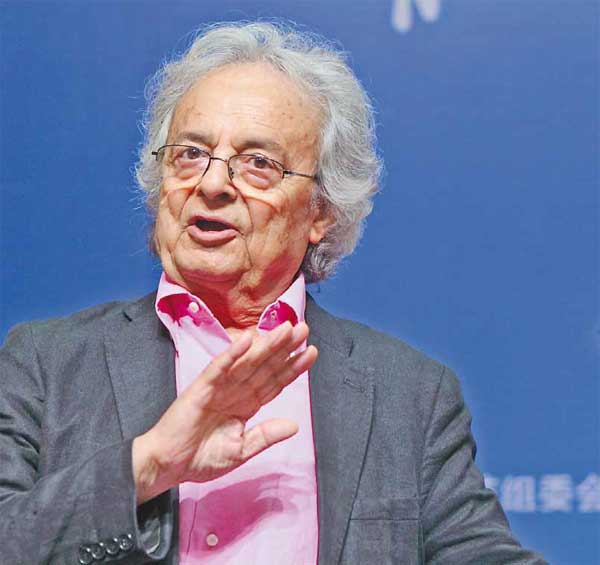 |
| Syrian-born poet Adonis(Photo/China Daily) |
The man often called the greatest living Arab poet was in China recently to collect a poetry prize. Deng Zhangyu chats with the writer about why the increasingly marginalized art form will never completely disappear.
In the information age, when poetry has been crowded out of the public sphere by the Internet, television, films and novels, Syrian-born poet Adonis is still enthusiastically greeted by Chinese fans.
He was followed by crowds of well-wishers wherever he went during his recent trip to China, despite it being his fifth visit to the country.
Dressed in a pink shirt, the 83-year-old poet, a perennial contender for the Nobel Prize in Literature, seems energetic, joking that wearing a bright color is a good way to attract female attention.
He was awarded the Golden Tibetan Antelope Poetry Prize from the Qinghai Lake International Poetry Festival 2013 on Aug 9, in western China's Xining, Qinghai province.
"I'm surprised that young Chinese still like reading poetry. Compared to Western countries, the popularity of poetry in China is not bad, although fewer and fewer people reading poetry is a common problem facing the whole world," Adonis says.
Regarded as "the greatest living poet of the Arab world" and an influential figure in Arabic literature, Adonis has published more than 20 books which have been translated into many different languages.
Four of his books have been translated to Chinese. The first, My Loneliness Is a Garden, was published in 2009. Now in its 10th edition, it has sold more than 40,000 copies and is listed as a best-seller on many online bookstores.
"It's really rare that a book of poems can be published to the 10th edition nowadays," says Shu Cai, a researcher with the Chinese Academy of Social Sciences and a poet.
Adonis says people are abandoning poetry because of the intrusion of technology in everyday living and people's increasingly busy lives, leaving little time for reading and thinking.
"It's impossible for commuters to read Shakespeare on subways. Not only poetry, but all serious works are facing the same problem," the poet says.
The Arabic poet is positive about the future of poems, believing poetry will never die as long as there is love, death and dreams.
"Technology can make it possible for people to wear the same clothes, drive the same cars and eat the same food, but it will never make people dream the same dream," he says.
Since 1988, Adonis has been a serial nominee for the Nobel Prize in Literature, but the elusive award has become something of a burden for Adonis — even in China he cannot avoid questions about the prize.
"I totally agree that if the next Nobel Prize in Literature is going to award a Chinese, it must be a Chinese poet.
"If China is the world's future, poetry must be China's future," Adonis says.
Xue Qingguo, Chinese translator of Adonis' books, explains that poetry for Adonis is more than verses. It means freedom, respect and liberation.
Xue says Adonis feels that whether China can revive the spirit of poetry or not, will determine the country's future.
Labeled by the West and the Arab world as a contrarian, Adonis admits that he loves rebellious poets such as French writers Charles Baudelaire and Jean Rimbaud and those who are brave to criticize the traditions of the old world.
Works across cultures, languages and races have greatly influenced the poet.
"I love China. It's brave enough to challenge the Western world. Compared to Europe and the US, China is like a young guy who dares to challenge the old guys from the West," Adonis says.
He says China listens to all voices of the world and is poised to take on any challenge, which he loves and respects.
Talking about his first trip to China in 1980, Adonis marvels at how much the country has changed over the past 33 years. Hundreds of bicycles used to glide along the streets like flocks of birds — now the streets are full of cars.
"Amazing! It proves the great creativity of Chinese people," he says.
"I think many Western critics make up nonsense about China given China's huge population," says Adonis, who is a critic of the Arabic world and the West.
Adonis was born in 1930 to a poor farming family in western Syria and named Ali Ahmad Said Esber. After spending six months in prison for joining a left-wing party, he moved to Lebanon in 1956, eventually settling in Paris in 1980.
Adonis' unsettled life means the issue of identity is one he has a strong interest in, and is a topic he has spent much time considering in recent years.
"Identity lies in the future instead of the past. It's a thing that people should never stop creating.
"What is China? Is it Shanghai, or Beijing or Hangzhou? No! All these cities together, that's China. So identity can be multifaceted," Adonis says.
He takes New York City as an example of how a society that accepts a multifaceted identity — New York has Chinese, Europeans, Africans, Indians and Latin Americans among others — is the most powerful.
Apart from the identity of poet, Adonis is also an artist. Years ago, he started creating collages as a way to kill time when he had no desire for writing.
Before he went to Qinghai to accept his poetry prize, he stopped in Shanghai to hold an exhibition of his collages at Minsheng Art Museum.
"I have to admit that selling a collage earns more than writing poems. It's a shame that the art market is overestimated," says Adonis, who always identifies himself as a poet rather than an artist.
 PLA's integrated battle group in live-fire drill
PLA's integrated battle group in live-fire drill Egypt's clashes kill 525 so far
Egypt's clashes kill 525 so far Phubbers turn social etiquette on its head
Phubbers turn social etiquette on its head Jaguar Land Rover to recall 11,852 cars
Jaguar Land Rover to recall 11,852 cars Ballet Swan Lake rehearsed in Taipei
Ballet Swan Lake rehearsed in Taipei  The five Hutong areas of Beijing
The five Hutong areas of BeijingDay|Week|Month